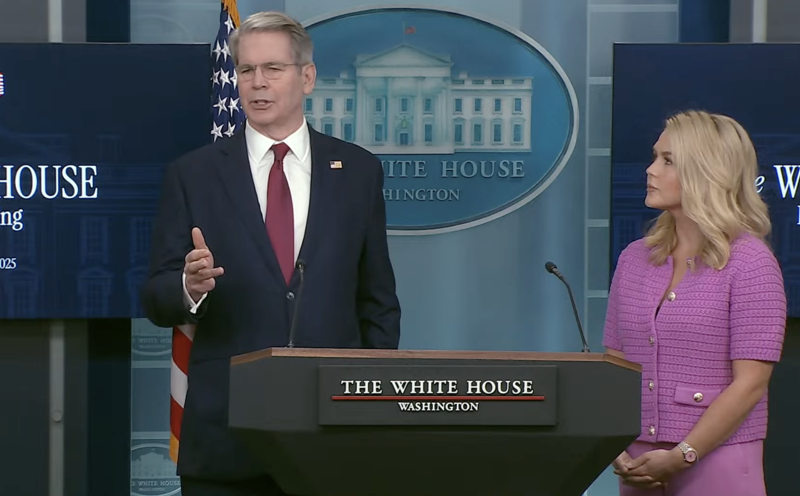U.S. Treasury Secretary Scott Bessent said Tuesday that tariffs could provide long-term revenue streams and act as a tool for free trade.
Bessent spoke on President Donald Trump’s 100th day in office of Trump’s second term, which so far has been dominated by trade and tariff issues.
“I think it is a combination of both. We’re going to take in long-term tariff revenue. We put a process in place. We have 18 important trading relationships, we will be speaking to all of those partners or at least 17 of them over the next few weeks. Many of them have already come to Washington,” Bessent said when asked what the White House’s objective is for tariffs. “What President Trump is referring to is the ability for tariff revenue to give income tax relief, and I think there’s a very good chance we will see this in the upcoming tax bill. The president campaigned on no tax on tips, no tax on Social Security, no tax on overtime and the restoring interest deductibility for American-made autos. Tariff income could be used for tax relief on all those immediately.”
Bessent said that tariffs in the past were used for revenue and said there’s a place for tariffs in U.S. fiscal policy.
“I think that it is something that got put away a long time ago, and I think that tariffs will bring back American manufacturing and generate substantial revenues,” Bessent said.
Bessent declined to provide specific details on U.S. trade talks with China but said he believes the tariffs are unsustainable for China and could cost the world’s second-largest economy millions of jobs.
The Treasury boss also said uncertainty in financial markets could come to end.
“I think one thing that has been a little disconcerting for the markets is President Trump creates what I would call ‘strategic uncertainty’ in the negotiation, so he is more concerned about getting the best possible trade deals for the American people,” Bessent said “… I think the aperture of uncertainty will be narrowing and as we start moving forward, announcing deals, then there will be certainty, but certainty is not necessarily a good thing in negotiating.”
Bessent said the president also wants to be flexible, including with U.S. auto makers. Those auto makers got an early break on tariffs but are seeking additional help.
Trump’s 25% tariff on foreign-made cars went into effect this month.
“He’s committed to bringing back auto production to the U.S. so we want to give the automakers a path to do that quickly, efficiently, and to create as many jobs as possible,” Bessent said.
Trump announced a slate of tariffs on April 2, which he called “Liberation Day” for American trade. Seven days later, on April 9, he paused nearly all of those higher rates that Trump calls reciprocal. Trump said the pause would last 90 days as his trade team talks with more than 75 other nations. However, Trump maintained a 10% baseline tariff and a 145% import duty on goods from China.
In March, Trump announced a 25% tariff on foreign-made passenger vehicles and auto parts that was implemented in April. He also put tariffs on steel and aluminum, which could affect automakers.
Economists, businesses, and a growing number of publicly traded companies have warned that tariffs could push up prices on a large swath of consumer products.
Trump has said he wants to use tariffs to bring back manufacturing jobs lost to lower-wage countries in decades past, shift the tax burden away from U.S. families, and pay down the national debt.
A tariff is a tax on imported goods. The importer pays the tax and can either absorb the loss or pass the cost on to consumers through higher prices.







